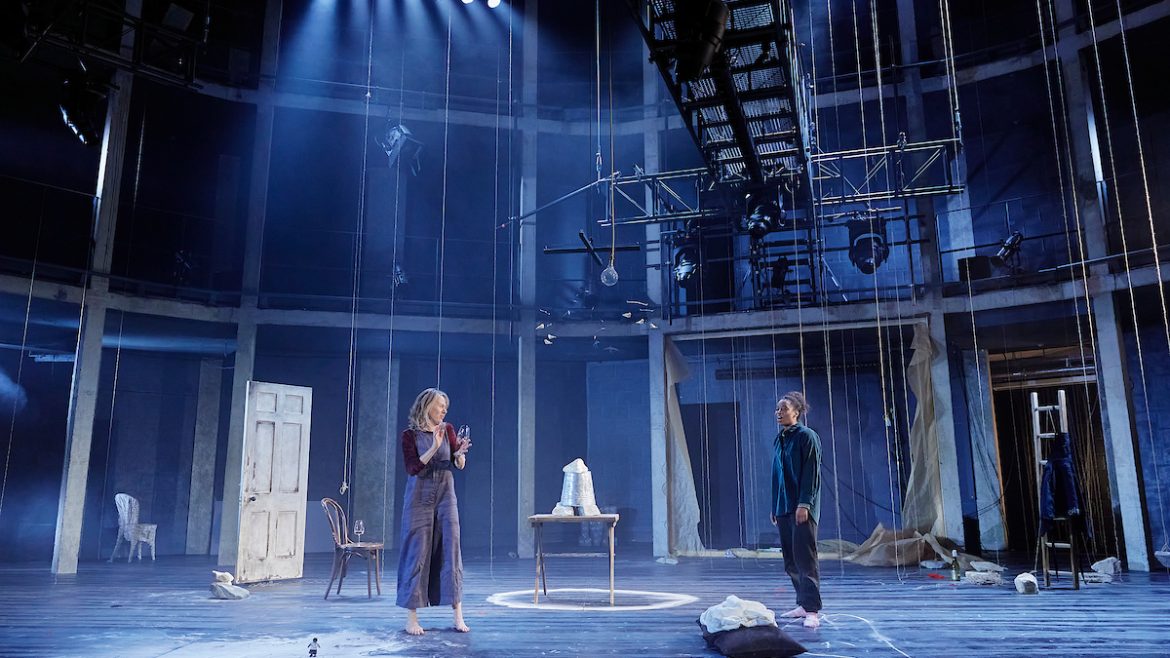Warning: this review contains spoilers
The Seven Pomegranate Seeds, an original production at the Rose Theatre in Kingston, is an enthralling, poignant and eye opening tale of seven women from Greek mythology.
Starring Niamh Cusack and Shannon Hayes, The Seven Pomegranate Seeds was written by Collin Teevan and directed by Melly Still. There are seven stories told through the use of monologues. Each of the seven segments is a modern retelling of stories about woman from Greek mythology.
These women are Persephone, Hypsipyle, Medea, Alcestis, Phaedra, Creusa and Demeter: the women of Euripides’ plays, all of whom are played by the two leads. In the play, each of these women are reimagined in modern settings to help put each of the Greek myths into a modern context.
The minimalist stage, with few props and a white screen on which light, shadow and art were projected, was used to great dramatic effect. Props and movement helped transform the stage into different settings for each character’s monologue.
Although the play may be confusing to audiences unfamiliar with its monologue format or with Greek mythology, the different situations the characters go through are reminiscent of the world today, which most audiences would recognise and understand.
The play begins with the over arching dynamic and emotions of the story of Persephone and her mother Demeter, with the classic Greek myth transported to Teevan, Yorkshire. In the first monologue, Persephone goes missing.
In the original Greek myth, she is taken to the underworld, where she is raped by Hades and then forced to spend months trapped there.
In the Yorkshire version, Persephone ignores her mother Demeter’s advice not to get lost, when she goes into the woods. Persephone falls down a dark pit, where she meets a man similar to Hades. It is implied that she was raped and murdered by a strange man, drawing similarities from the original myth.
Demeter is shown searching for her daughter for years, and becomes known as the sad, lonely and crazed women in her town. She never manages to find out what happened to her daughter.
In the second monologue, Medea is transported to the Midlands where she becomes the victim of a violent abusive relationship with her husband, whom she escaped. She divorces her husband after he is charged with domestic violence and is sent to prison.
Medea’s story gets darker as she learns of the death of her children. She is informed by police that her ex husband has escaped prison before finding her children and jumping out of a high storey window with them.
Creusa, played by Cusak, turns into a woman who had to give her own child up for adoption as a teenager, in Shoreditch. Her outburst at her friend, who recently adopted a Syrian child, is chilling as Creusa finally snaps. Cusack shows the character’s bottled up range to dramatic effect, with the raw emotion she expresses in Creusa’s outburst.
Pedra, from the Fells, is a distraught women who wrongly and hopelessly falls in love with her teenage stepson, who eventually dies. The personality switch of Pedra is compelling to watch as you audibly and visually see Pedra’s inner conflict.
Pedra’s personality switches from drinking her troubles away to scolding herself as she knows her feelings for her teenage stepson are wrong. She constantly switches between personalities where she is obsessed with her stepson and is tempted to act on her intense attraction.
Cusack and Hayes smoothly transition between stories and characters, both taking on the roles of the mothers, children and husbands. The cast gives distinct voices and mannerisms to each character extracted from Greek mythology. This helps the audience to see how different each character truly is, with complex personalities and situations.
It is refreshing to see a play that is unafraid to ground itself on a real level with its audience. The play is self aware about the issues, scenarios and stories it portrays. One of the earlier stories show Hypsipyle working as a nanny in present day Washington State. She is later accused of shaking the boy in her care to death. Recent capitol riots are heavily mentioned through the characters’ monologue and in a news report you can hear being read from their unseen television.
That doesn’t mean the play is without its contemporary, yet light, doses of humour, particularly in the fourth story, where Alcestis is married to a hotel owner. Alcestis’ husband is known for his famed interactions with his celebrity guests at his hotel. A fictional version of Pierce Brosnan takes a pivotal role in this story.
The moment the 007 theme music came on, it had the audience laughing out loud. Especially when Alcestis began to complain how that current blond guy who plays Bond is nowhere as good as the ‘great’ Brosnan.
In a roundabout way, the play came to an emotionally compelling conclusion, referring to the start of the play. At the beginning, Persephone’s mother spoke of summer and a girl.
This begins to set the scene for the first story, which she described as being in “another time, another world – where it was always summer”. In the end, it is time for Demeter’s story to be told, as a modern woman reunited with the son she was forced to give up for adoption.
Cusack, playing the role of Demeter, breaks the fourth wall in the final words of the monologue, reflecting on the character’s situation. The reunion represents how the strength and diversity of women, their shared experiences – the good and the bad – and the perseverance to keep going is a good thing. She says “We are whole again, we have found what is ours. And summer returns with a golden flower.”
The metaphor carried throughout the play, addressing both the light and dark aspects women’s lives, represents how the summer, the light at the end of the tunnel and hope towards a better future for women is always there.
The Seven Pomegranate Seeds premiered on November 4 and the play will end its run on November 20.





